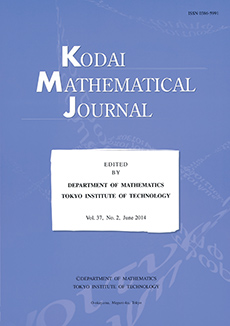Abstract
We consider a differential equation $f^{\left( n\right) }+A_{n-1}\left( z\right) f^{\left( n-1\right) }+...+A_{1}\left( z\right) f^{^{/}}+A_{0}\left( z\right) f=0,$ where $A_{0}\left( z\right) ,...,A_{n-1}\left( z\right) $ are entire functions with $A_{0}\left( z\right) \hbox{$/\hskip -11pt\equiv$}0$. Suppose that there exist a positive number $\mu ,$\ and a sequence $\left( z_{j}\right) _{j\in N}$ with $\stackunder{j\rightarrow +\infty }{\lim }z_{j}=\infty ,$ \ and also two real numbers $\alpha ,\beta $ $\left( \ 0\leq \beta \alpha \right) $\ such that \ $\left| A_{0}\left( z_{j}\right) \right| \geq e^{\alpha \left| z_{j}\right| ^{\mu }}\quad $and$% \quad \left| A_{k}\left( z_{j}\right) \right| \leq e^{\beta \left| z_{j}\right| ^{\mu }}$ as $\ j\rightarrow +\infty $ $\left( k=1,...,n-1\right) $. We prove that all solutions \ $f% \hbox{$/\hskip -11pt\equiv$}0$ of this equation are of infinite order. This result is a generalization of one theorem of Gundersen $\left( \left[ 3\right] ,\text{ }% p.\text{ }418\right) .$
Citation
Benharrat Bela\"{i}di. Saada Hamouda. "Growth of solutions of an $n$-th order linear differential equation with entire coefficients." Kodai Math. J. 25 (3) 240 - 245, October 2002. https://doi.org/10.2996/kmj/1071674457
Information





